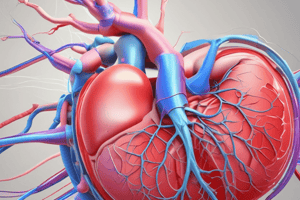Podcast
Questions and Answers
What is the intrinsic rate of the SA node (Sinoatrial)?
What is the intrinsic rate of the SA node (Sinoatrial)?
- 60-100 bpm (correct)
- 150-250 bpm
- 20-40 bpm
- 40-60 bpm
What is the intrinsic rate of the AV node (Atrioventricular)?
What is the intrinsic rate of the AV node (Atrioventricular)?
- 20-40 bpm
- 100-150 bpm
- 40-60 bpm (correct)
- 60-100 bpm
What are the intrinsic rates of ventricles?
What are the intrinsic rates of ventricles?
20-40 bpm
A normal sinus rhythm is between ______ bpm.
A normal sinus rhythm is between ______ bpm.
Sinus Arrhythmia involves the heart speeding up and slowing down with breathing.
Sinus Arrhythmia involves the heart speeding up and slowing down with breathing.
Which of these are types of cardiac dysrhythmias?
Which of these are types of cardiac dysrhythmias?
What is sinus tachycardia?
What is sinus tachycardia?
PSVT stands for ______.
PSVT stands for ______.
Ventricular tachycardia can be life-threatening.
Ventricular tachycardia can be life-threatening.
What is a common symptom of atrial fibrillation?
What is a common symptom of atrial fibrillation?
What causes ventricular fibrillation?
What causes ventricular fibrillation?
What is the intrinsic rate of sinus bradycardia?
What is the intrinsic rate of sinus bradycardia?
Flashcards are hidden until you start studying
Study Notes
Cardiac Conduction Components
- SA Node: Intrinsic rate of 60-100 bpm; serves as the natural pacemaker initiating the heartbeat.
- AV Node: Intrinsic rate of 40-60 bpm; can drop to 20-40 bpm if ventricular tissue takes over.
- Ventricles: Intrinsic rate of 20-40 bpm.
Heart Rhythms
- Sinus Rhythm: Normal rhythm characterized by a rate of 60-100 bpm, including P wave, QRS complex, and T wave.
- Sinus Arrhythmia: Normal fluctuation in heart rate associated with breathing (speeds up during inhalation, slows during exhalation).
Cardiac Dysrhythmias
- Types: Tachycardias, premature contractions, flutter, fibrillation, bradycardias, AV conduction disorders, asystole/ventricular standstill.
Tachycardias
- Defined by a heart rate over 100 bpm; indicates the body's compensatory response.
- Sinus Tachycardia: Originates from the SA node, rates of 100-150 bpm, can exceed 150 bpm under extreme stress.
Causes and Symptoms of Sinus Tachycardia
- Common causes include fever, anemia, hypermetabolic states, and drug influences.
- Symptoms may include lightheadedness due to reduced stroke volume and decreased filling time of the heart.
Supraventricular and Ventricular Arrhythmias
- PSVT: Paroxysmal supraventricular tachycardia characterized by sudden onset and termination.
- Ventricular Tachycardia: Serious condition with rates of 150-250 bpm; associated with poor ventricular filling times and reduced consciousness, often following myocardial infarction.
Premature Contractions
- Premature Atrial Contractions (PACs): Common occurrences leading to early atrial contractions; may feel a fluttering sensation.
- Premature Ventricular Contractions (PVCs): Often caused by low potassium; problematic only if frequent, may result in insufficient ventricle filling.
Flutter and Fibrillation
- Atrial Fibrillation: Rapid irritable quivering of the atrial tissue (>300 bpm), increasing thrombosis risk due to erratic impulses leading to potential strokes.
- Atrial Flutter: Less common than AFib; organized pattern of rapid atrial depolarization (250-350 bpm), also increases the risk for heart failure.
Ventricular Fibrillation
- Life-threatening condition with chaotic electrical activity in ventricles leading to no effective cardiac output; results in unconsciousness and pulselessness.
- Requires immediate defibrillation for a chance at survival.
Bradycardias
- Refers to slower heart rhythms; Sinus Bradycardia is a specific type that requires further definition.
Studying That Suits You
Use AI to generate personalized quizzes and flashcards to suit your learning preferences.



